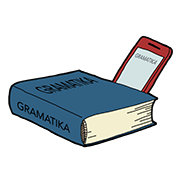A so-called specific learning disability that causes difficulties in reading, despite good teaching, home practice and adequate (sometimes even above-average!) intellectual capacities. It is said that people with dyslexia are those who learn differently.
Current research indicates that these problems are caused by a minor damage to the central nervous system and are probably hereditary. They are associated with several other types of disabilities and in everyday life they manifest as difficulties in reading. These troubles persist throughout life and are not related only to school. It depends on their intensity, and also on the extent of therapeutic work (the so-called reeducation). Sometimes these difficulties can be completely minimized later in life, sometimes the individual still perceives them as very intense. Moreover, it is also important to understand the conditions under which the person manages to read better. If possible, it’s good to create a reading environment that doesn’t oppress the individual. Factors that can contribute to this are a certain time of the day, but also peace and plenty of time for reading, and the use of various modern technologies (e.g. e-readers, voice recordings from the computer, audiobooks, setting the computer to make texts as easy to take in as possible).
Nowadays we live in a so-called information society where we are constantly exchanging information using reading and writing, and for people who have learned to read quickly and easily already in first grade of primary school it can be sometimes inconceivable that someone cannot do it. That’s perhaps why dyslexia is becoming bigger problem than it was in the past. At the same time, however, we begin to hear that people with dyslexia are those who learn differently. This means that they can learn (some may be important experts in their field), but they need to find slightly different ways of learning and have such conditions created for them that would prevent reading and writing from restricting the manifestation of their abilities. The older a person is, the more they should be able to say for themselves under what circumstances it is easier for them to learn and work. In all types of schools, pupils with dyslexia are entitled to have the conditions for studying adjusted for them, but it is good to know exactly what they need, so that any adjustments are actually effective.

Tip: If you aren’t sure how to write something, use an overview of grammar rules. You can create such an overview on your computer to make it easier for you to use.